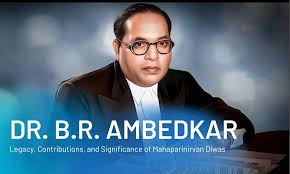Mahaparinirvan Diwas 2024: Commemoration of Dr. B.R. Ambedkar’s Legacy (GS Paper 2, Society)

Context:
- The 69th Mahaparinirvan Diwas is being observed on 6th December 2024 to mark the death anniversary of Dr. Bhimrao Ramji Ambedkar, a pioneering social reformer, lawyer, and architect of the Indian Constitution.
- This day holds deep significance in honoring his transformative legacy and contributions to social justice and equality.
Significance of Mahaparinirvan Diwas:
- The term "Mahaparinirvan" refers to the concept of nirvana after death, and in Buddhist texts, it symbolizes liberation from the cycle of death and birth.
- This concept was deeply revered by Dr. Ambedkar, who, inspired by the teachings of Lord Buddha, embraced Buddhism as a path to liberation and a means to fight against caste-based oppression.
- The Mahaparinirvan Diwas reminds us of Dr. Ambedkar's vision for justice, equality, and liberty, urging us to continue his work toward a more inclusive and harmonious society.
Dr. B.R. Ambedkar’s Life and Legacy:
- Born on April 14, 1891, in Mhow, Madhya Pradesh, Dr. Ambedkar came from the Mahar caste, one of the untouchable/Dalit communities in India.
- His life was a relentless struggle against the systemic social discrimination faced by marginalized communities, especially Dalits, women, and laborers.
Key Contributions:
-
- Caste Reform and Upliftment: Dr. Ambedkar dedicated his life to the upliftment of the marginalized. He highlighted caste oppression as a major divide in Indian society and advocated for reservations in education, employment, and politics to promote social justice.
- Founding of Social Welfare Organizations: In 1923, he established the Bahishkrit Hitkarini Sabha (Outcastes Welfare Association) to spread education and improve economic conditions. In 1924, he formed an association focused on the welfare of depressed classes.
- Leadership in Movements: Dr. Ambedkar led significant movements like the Mahad March (1927) for access to public water and the Kalaram Temple entry movement (1930), which challenged caste hierarchies and priestly dominance.
- Poona Pact (1932): He signed the Poona Pact with Mahatma Gandhi, ensuring reserved seats for Dalits in legislatures, a milestone in their political representation.
- Drafting the Indian Constitution: Dr. Ambedkar played a pivotal role in drafting the Indian Constitution as the first Law Minister of independent India. His contributions to the Constitution laid the foundation for the secular, democratic, and just republic we have today.
- Buddhism and Social Liberation: In 1956, Dr. Ambedkar converted to Buddhism, emphasizing the path to liberation and a life free from caste oppression.
Posthumous Honors:
- Dr. Ambedkar was awarded the Bharat Ratna in 1990, India’s highest civilian honor, for his invaluable contributions to the nation.
Impact on Indian Society:
- Legal and Social Reforms: His work paved the way for affirmative action in India and laid down the legal framework for the protection of human rights, making him a champion of the downtrodden.
- Empowerment of Marginalized Communities: Dr. Ambedkar's advocacy for the Dalits, women, and laborers directly contributed to their empowerment and inclusion in the socio-political fabric of India.
Conclusion:
- Mahaparinirvan Diwas is not only a day to remember Dr. B.R. Ambedkar's monumental achievements but also an occasion to reflect on his enduring legacy.
- It inspires us to continue fighting for justice, equality, and liberty, embodying the ideals he set forth for a more inclusive and equitable society.


